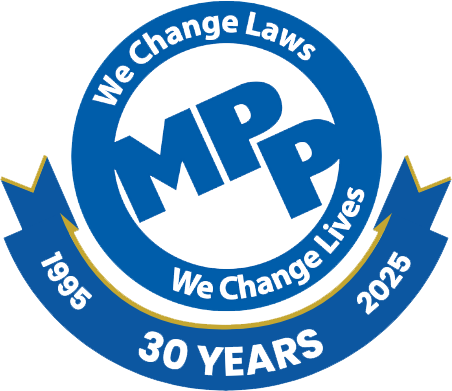- Take Action: Urge your state legislators to support a compassionate medical cannabis program!
Press Release
Jeb Bush Expresses Support for Decriminalizing Marijuana, Receives Boost in MPP's Presidential Candidate Report Card

FOR IMMEDIATE RELEASE
Saturday, December 12, 2015
Contact: Violet Cavendish
vcavendish@mpp.org
The nation’s largest marijuana policy organization upgraded Bush — who had not previously expressed support for decriminalization — from a ‘D’ to a ‘C-’ following a Friday interview on a Boston radio station
* Statement below from Mason Tvert of the Marijuana Policy Project *
WASHINGTON, D.C. — The nation’s largest marijuana policy organization upgraded Jeb Bush from a “D” to a “C-” in its 2016 presidential candidate report card on Friday following a radio interview in which the former Florida governor expressed support for decriminalizing marijuana.
According to a report from Marijuana.com:
“It’s one thing to say we should have decriminalization of marijuana. I support that,” the former Florida governor said in an interview with Joe Mathieu of Boston’s WBZ NewsRadio. Bush had not previously endorsed a removal of criminal penalties for cannabis possession.
Bush also referred to marijuana as a “gateway drug” during the interview, referencing a theory that was thoroughly debunked by the National Academy of Sciences’ Institute of Medicine in a 1999 report commissioned by the White House Office of National Drug Control Policy. He also said “the new marijuana” is “highly, highly toxic,” despite researchers consistently finding that marijuana is among the least toxic drugs and incapable of producing a fatal overdose.
The Marijuana Policy Project’s voter guide, launched in June, grades the major-party presidential hopefuls based on actions they have taken and statements they have made that indicate their levels of support for ending marijuana prohibition, allowing legal access to medical marijuana, and defending states’ rights to adopt their own marijuana policies without interference from the federal government. The voter guide can be viewed online at http:// mpp.org/president.
In October, MPP boosted Republican candidate Mike Huckabee from a “D” to a “B-” following an interview in which he expressed a more sympathetic position on medical marijuana and said he would not use federal resources to interfere in states that have adopted laws that legalize and regulate marijuana for adult use. MPP upgraded Bernie Sanders from a “B” to an “A” after he became the first-ever major-party presidential candidate to express support for ending marijuana prohibition, and it boosted Hillary Clinton from a “B-“ to a “B” because she strengthened her position in support of allowing access to medical marijuana.
Statement from Mason Tvert, director of communications for the Marijuana Policy Project:
“We’re glad to hear Gov. Bush is in favor of removing criminal penalties for at least some marijuana-related offenses. We hope he will elaborate on this position and let voters know what he would do on this front if elected. A solid majority of Americans think marijuana should be legal for adults, and an even stronger majority support legal access to medical marijuana. Gov. Bush might be evolving on the issue, but he’s still lagging behind most Americans.
“It’s always astonishing to hear someone running for our nation’s highest office still believes in the reefer madness that was conjured up more than half a century ago. Equating marijuana to heroin is like equating apples to orange soda. The marijuana that is available today is no more toxic than the marijuana Gov. Bush used in college. It was far less toxic than alcohol then, and it’s far less toxic than alcohol now.”
###
Founded in 1995, the Marijuana Policy Project (MPP) is the nation’s leading cannabis policy reform organization. MPP has played a central role in passing dozens of cannabis policy reforms in states across the country, including 14 successful cannabis legalization campaigns, and also works to advance federal reforms.
